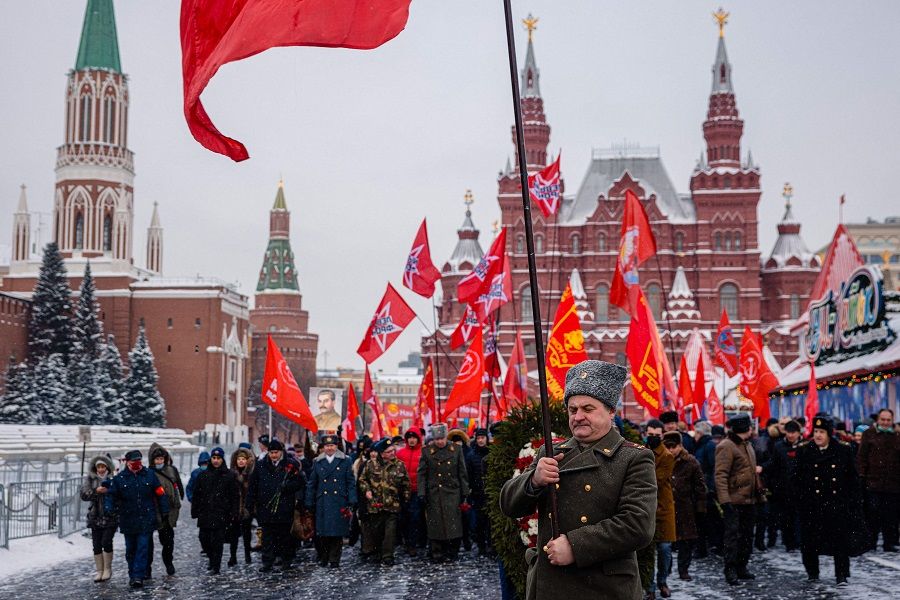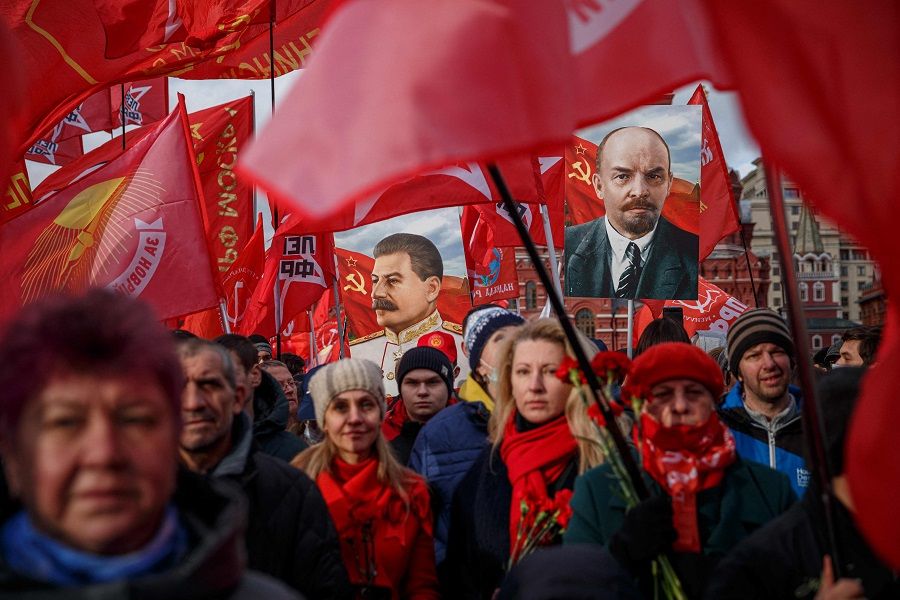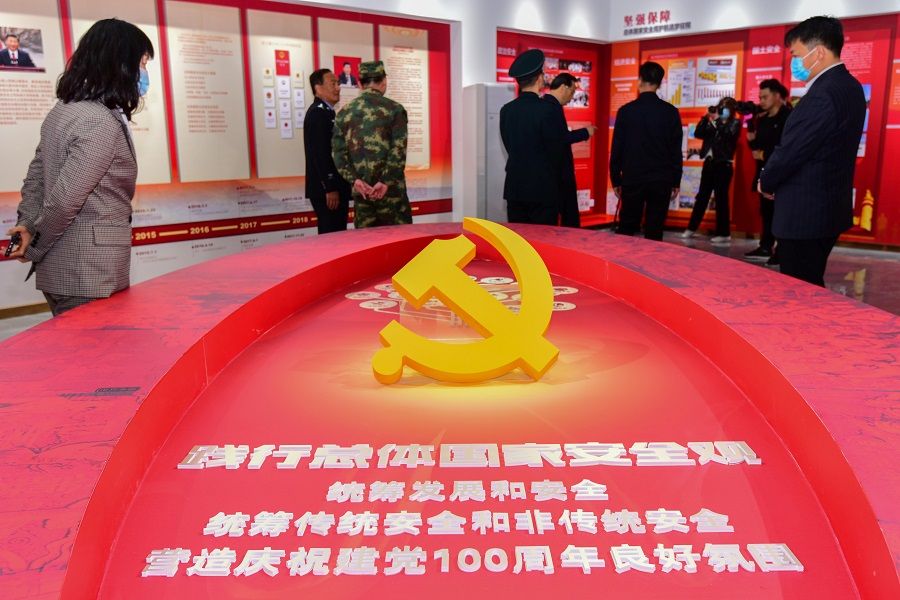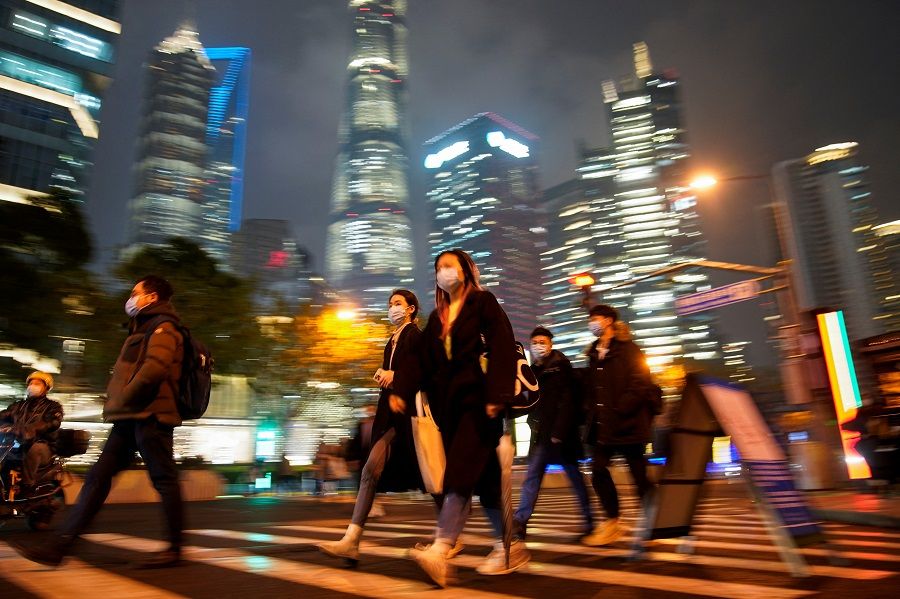Is Chinese socialism superior?

According to Karl Marx, the fundamental contradiction in capitalism is that between the socialisation of production and the private ownership of the means of production. The cycle of economic crises therefrom continues till this day, making socialism still relevant. It gives the Chinese Communist Party (CCP) a good reason to keep believing in a glorious future for socialism. Nevertheless, socialism too has its own basic contradictions, which caused the crashing down of the socialist camp 30 years ago.
The basic contradictions of Stalinist socialism fall into two categories - economic and political. The basic contradiction associated with the economy is well known to all. It is the contradiction between ossified state planning and the general lack of motivation for production and innovation on one hand, and the requirements for sustained modernisation on the other.
For the USSR and the socialist states of Eastern Europe, this caused economic stagnation, as well as backwardness in science and technology. In China, Mao Zedong tried to carve out a different path by boosting proactivity through "grasping revolution to promote production" (抓革命,促生产). His failed attempt not only resulted in China lagging behind in science, technology and productivity but also set off national catastrophes like the Great Leap Forward and the Cultural Revolution.
People however are much less familiar with the basic contradiction inherent in socialist politics. Historically, the lack of understanding had caused socialist states to lose their way in their reform attempts, resulting ultimately in the collapse of the Soviet Union and the communist regimes of Eastern Europe. The current regression in some aspects of Chinese politics is also linked to such epistemic nebulosity.
The dramatic upheavals in the USSR and Eastern Europe three decades ago caught everyone by surprise, but they were most telling of the basic contradiction of socialist politics. People were surprised because the mainstream methods of political analysis are based on power differentials and stakeholders' relations. The state of the Soviet Union just before its demise showed no sign of imminent crisis according to such analysis.
The powerful Red Army had always been tightly controlled by the Communist Party's organisations. With no organised opposition or large-scale social movements, the society was inept. The party members, numbering more than ten million, had taken up all the important positions in the political, economic and social spheres.
In other words, whether we look at the situation in terms of the power differential or the nexus of vested interests, the rule of the Communist Party of the Soviet Union (CPSU) should have been well entrenched and self-perpetuating.
In retrospect, the revolutions in the communist world in the early 1990s were essentially revolutions brought on not by a change in the balance of power or stakeholders' relations, but by an explosion of moral indignation.

Yet the mighty Soviet empire disappeared overnight. The swirling maelstrom left behind by this fateful event spells a big question mark in history.
A moral revolution brought down communism
In retrospect, the revolutions in the communist world in the early 1990s were essentially revolutions brought on not by a change in the balance of power or stakeholders' relations, but by an explosion of moral indignation. With moral indignation, even those who know that their power, positions and interests could be impaired would take part in the revolutionary action, causing oppositions to suddenly emerge from within the system and incapacitating the machinery of repression. Nothing is more fatal to the system.
Part of the lead-up to the revolutions in the communist world was the Tiananmen Square incident in 1989. In that particular event, a great number of people took part in the processions, many of them under the banner of institutional units that were part and parcel of the party-state establishment. This spelt an unprecedented crisis for the Chinese Communist regime - one which came forth from within.
A moral revolution is a response to injustice, a mass movement ignited by a sense of righteousness. It often does not need to be organised purposefully. It stems from a common moral judgement and certain public sentiments smouldering below the surface. A revolution like this has very little to do with poverty or the material conditions of life. Since the beginning of the 21st century, many such protest movements have taken place around the world. And they all occurred during a period of the fastest decline in poverty worldwide.
Although the moral perceptions and hostile emotions involved are built up over time from prolonged cognitive dissonance and mental frustrations, no one can predict exactly when and under what conditions they would erupt. When they do blow up, the consequences are very clear. Those in power are swept out of the door. The regime and political system collapse completely and lose all of their legitimacy (at least for the short term). That's because moral judgements, especially collective moral judgement, are steeped in dualism. Things are seen as either right or wrong, black or white, but never in between.
A moral revolution is often unprepared for post-revolution rebuilding, and lacking in consensus for it too. In the course of history, it may bring about social progress, but the more often outcome is long-term turmoil or even regression, as evidenced by Post-Soviet Russia or the aftermath of the French Revolution.

The fundamental political reason for the CPSU's demise was the fact that the ruling party had morphed into a corrupt and privileged clique detached from the masses. It became the opposite of what it proclaimed to stand for, so much so that it was mercilessly abandoned not only by the people at large, but even its own rank and file members and cadres too. The inevitability of this outcome follows from the fundamental logic of how the political system works, and is the corollary of what I have dubbed "Stalin's curse". The basic contradiction of socialist politics as revealed by this process is rooted in the clash between the two fundamental requirements of the vanguard party's rule.
Precisely because it does not need votes to hold power, the vanguard party has an inborn tendency to divorce itself from the masses and form an enclosed privileged class with entrenched interests.
A self-serving ruling clique
The first requirement is that the system has to be authoritarian in nature, with virtually no room to accommodate electoral democracy. The core of the political system under Stalinist socialism (i.e., communism in mainstream Western parlance) is the Leninist vanguard party-the ruling Communist Party of the various communist states. The vanguard party is formed to realise certain ideals, not to win votes.
Its leader is the high priest for those ideals, and therefore also wields the ultimate authority within the party. The programme of action formulated to realise the ideals requires a disciplined organisation for its implementation. Subordinates must obey the higher-ups and the whole party must obey its central authority.
"One party, one ideology and one supreme leader" is the ideal political order in vanguard party rule, and so is the demand for absolute loyalty and voluntary compliance. The whole set-up imparts a distinctive disciplinary quality to the vanguard party, giving rise to a top-down mode of operation of political power, which is exactly antithetical to the logic of power authorisation followed in democracies with universal suffrage.
Precisely because it does not need votes to hold power, the vanguard party has an inborn tendency to divorce itself from the masses and form an enclosed privileged class with entrenched interests. And since the officials on all levels are appointed by their higher-ups, accountability to the people above and not to the masses below is an ironclad rule in such a system.
A 'virtuocracy'
The second requirement pertains to the legitimacy of vanguard party rule. It revolves around the "purity" (纯洁性) and "progressiveness" (先进性)of the party's members, manifested as high standards set for its cadres and party members in moral fibre and competence in getting work done.
In compensation for the absence of popular mandate via democratic elections, being exemplary in moral character and competence at work are required to serve two critical roles in the system: (1) outside the party, these are the main ways for securing the people's support and gain legitimacy for the party's rule; (2) within the party, they are the means for the higher-ups to command the respect and following of their subordinates. Both aspects are essential for maintaining the pyramid of power and its mode of operation.
The CCP's criteria for cadre selection and promotion of cadres are summed up as "[exhibiting] both virtue and competence, with virtue taking the precedence".

The cards the CCP plays both within and outside the party are always about winning the hearts and minds but not votes. Seeking to win hearts and minds necessarily results in the party and its cadres being held to high standards and strict requirements, especially with regard to their moral character. They have to maintain good personal conduct and speech, walk the talk, and establish trustworthiness carefully. The CCP's criteria for cadre selection and promotion of cadres are summed up as "[exhibiting] both virtue and competence, with virtue taking the precedence". "Virtuocracy" is what distinguishes the CCP's rule from other authoritarian systems.
The fundamental contradiction in socialist politics manifests as the clash between these two general imperatives outlined above. On one hand, there are high expectations for the government and its officials in terms of character and competence; on the other hand, because power is highly concentrated with neither supervision by the masses nor any effective, internal checks and balances, power is extremely corrupting in a communist system - very few people can truly resist the temptation of corruption and always stay unsullied.
In short, the ruling party is never capable of meeting the high standards it sets for itself.
Thus, one observes the coexistence of the model vanguard alongside scandalous behaviours, and high profile anti-corruption campaigns alongside rampant and outrageous corruption. Notably, corruption in the appointment of personnel has allowed crooks to carry the day, and made ordinary people suffer while damaging the economy and degrading social mores.
What we have here, is a system that constantly raises expectations, only to repeatedly produce disillusionment and moral indignation. In short, the ruling party is never capable of meeting the high standards it sets for itself. Or to put it less kindly, the party is always "slapping itself in the face", effectively discrediting their own words.
Thanks to this contradiction, the effort at winning the people's hearts and minds is destined to fail. Long-accumulated discontent within the populace and the party (a reliable indicator of which is the number of political jokes circulating in society) provides ample dynamite for a moral revolution to be set off. All it takes is a spark.
The limitation of Chinese reforms
Now, the question is: after 40 years of reform, to what extent has China resolved the basic contradictions inherent in socialism of the Stalinist tradition?
On the economic front, we may say the resolution has been quite successful. The abolition of the planned economy removed a large chunk of the rigid state bureaucracy. The introduction of market competition and private enterprises iron out to a great extent the motivation problem. That the Chinese economy took off spectacularly is proof of success.

Some progress has been made in resolving the basic contradiction in politics, especially in terms of strengthening the legal framework and intra-party institution building. The resulting rules, laws and institutions have succeeded to some extent to "shut power in the cage of institutions", as Xi Jinping put it. However, due to systemic inertia and epistemic nebulosity, the progress of reform in some important areas are slow or even regressing.
Currently, the CCP's method of resolving the basic contradiction in socialist politics is to "exercise strict governance over the party comprehensively" - that is to say, to perfect and reinforce the party's internal rules and regulations, to strengthen the moral conviction and ideological faith of its members and cadres. This is essentially about improving the state of the party in order to meet the high standards and expectations better, rather than lowering the bar.
Accordingly, an anti-corruption campaign of unprecedented intensity and duration was launched. In the same spirit, large-scale institution building (including the legal system and party discipline) is being undertaken, in the hope of attaining the aspired state in which officials have "no guts, means or desires to engage in corruption" (不敢腐,不能腐,不想腐).
Meanwhile, the party is upgrading its ruling capability through the "modernisation of the state's systems and capabilities for governance", including its competencies for decision-making, coordination, execution, mustering resources, concentrating strength, resolving social conflicts, maintaining political stability and so on.
When Xi Jinping asserted that "we shall resolutely never change whatever in our system that should not be changed", the underlying sentiment was not wholly unenlightened obstinacy as some people frame it, but a desire to retain the strengths of the system.
Outside the party, the CCP has in recent years been placing more emphasis on the regime's "affinity with the people", as well as aligning and uniting this "affinity" with its "party nature". It claims that "fulfilling the people's yearning for a good life is what we are fighting to achieve". It has devoted a lot of effort into poverty alleviation and responded quickly to the people's demands, often more keenly attuned than an elected government.
Over the last four decades, the CCP's policies have been basically in accord with both public sentiments and the national conditions. The Chinese government enjoys higher approval ratings in the polls than most elected governments do. The speed of China's economic development and social progress is nothing short of miraculous.
Xi is commendable for his effort building up the legal and institutional infrastructure. However, like Mao, he also seeks to concentrate power in himself, which is likely to undermine his effort at institution building...

Nevertheless, such an approach can only alleviate but not completely resolve the basic contradiction in socialist politics. To "resolutely never change" is not without its blind side. Stalin's curse is still operational at different levels of the political hierarchy.
In the upper echelons, personality cult has been popping up now and then in recent years, betraying a muddled understanding and judgement of affairs. In the middle echelons, old maladies like formalism, bureaucratism, dogmatism, currying favour, sycophancy and reporting only good news (while withholding bad news) are in resurgence, further compounded by new problems such as indolence and inaction. In the lower echelons, "enhancing affinity with the people" is implemented largely through top-down pressure without the participation of the people, and with a lack of institutional safeguards. Cadres could either slavishly serve the people or arrogantly lord over them, and all these point to a systemic origin. Also, corruption remains a serious problem throughout.
When it comes to beefing up the cadres' ideological faith, emphasizing the regime's affinity with the people, and promoting the credo of "serving the people", there is probably no one who can hold a candle to Mao Zedong. Given that even Mao himself had failed on this path, how could anyone do better at this?
Compared to Mao's self-characterization as "a [Buddhist] monk holding an umbrella", meaning "lawless and godless" (无法[发]无天), Xi is commendable for his effort building up the legal and institutional infrastructure. However, like Mao, he also seeks to concentrate power in himself, which is likely to undermine his effort at institution building, the way Mao's whimsicality did in the Cultural Revolution.
To have the party's organisations encroaching into every economic and social organisation is in effect to expand the impact of the basic political contradiction inherent in socialism. It remains questionable whether doing so would truly enhance the party's control and improve its governance.
What we do know from the CPSU's history, however, is that such expansion would bring onto the party unlimited liabilities - the ruling party would be tarnished by the bad things done by every one of its members and cadres. Lastly, the inadequate understanding of the basic political contradiction may also lead to the resurgence of the basic economic contradiction of socialism. As the party's omnipresent organisations tighten their grip on the economy and society at the micro-level, it may bring the old command economy back to life, with the party's power suppressing the vitality of the society and undermining the legal foundation of the market economy.
Summing up the above analysis, we can only conclude that the fundamental contradictions of socialism are yet to be rooted out completely in China. To do so requires a new way of thinking and more thorough-going reforms. Even with the tremendous achievements in the past, to speak of the "superiority of socialism" without fully resolving its basic contradictions is premature.
Related: Can the CCP avoid Stalin's curse under Xi Jinping? | 'Red peril' or benign power: How different is China's CCP from USSR's CPSU? | Rise of China's CCP and demise of USSR's CPSU: A tale of two communist parties | Overseas culprits triggered Tiananmen incident; China will advance under Xi Jinping Thought: CPC's third historical resolution | Chinese researcher: This is how China gets rid of poverty
